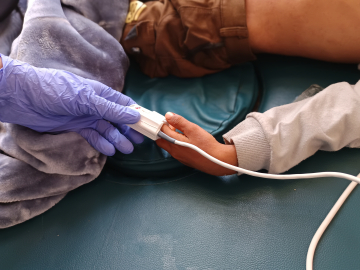An Egg a Day Helped Stave off Malnutrition in China
Since 2010, primary schools across rural China have participated in the One Egg Program, an initiative from the nonprofit Shanghai United Foundation that aims to promote stable growth and stave off malnutrition among rural schoolchildren using a simple but unusual method: Serving them a single hard-boiled egg each day. How well has it worked?
Minchao Jin, a clinical associate professor at NYU Silver School of Social Work, co-authored the study along with Jun-Hong Chen, a NYU Master of Social Work alumnus and a PhD candidate in social work at Washington University in St. Louis, have investigated that question. In the spring of 2017, they began following 252 rural children who were receiving the protein boost at school. After about 220 school days, the students saw significant improvements in their height, weight, and body mass compared to 94 students who weren’t part of the voluntary program, according to research published last month in the journal Nutrition.
Jin spoke about how the humble egg can play a key role in supporting kids’ nutrition and growth—but that it’s not a one-size-fits-all solution.
So, why eggs?
It was based on an intuitive idea. In Chinese culture the egg is very significant, valued for centuries as a food supplement—especially for children, pregnant women, and those who are ill. This was before we knew about nutrition science—which shows that eggs are an excellent source of protein, vitamins A, D, and E, and fats including omega-3 fatty acids. This research aimed to provide scientific evidence behind that belief.
Would this type of intervention be possible, and achieve the same nutritional goals, with other types of food?
The nutrition provided by eggs can be provided by other kinds of food sources like, for example, one carton of milk per day, which is common in the U.S. But milk requires colder storage, is more complex to transport, and spoils easily. And in China, a 200ml serving of milk is at least double the cost of a single egg. Eggs are easy to cook, easy to transport, and one egg per students is easy for teachers to measure.
Beyond the benefit of eggs, what did you learn about the diets of China’s rural schoolchildren?
Despite the cultural significance of eggs, these rural children were not eating them very often, and finding out why may be a topic for future research. At several schools, we gave cameras to students and their teachers and asked to document their diet, and we found that many of these children did not have much animal-source food in their diet. Often we would see just vegetables, rice, and potatoes.
Would this intervention potentially benefit children across China?
Potentially, but it’s not one-size-fits-all. In China’s biggest cities like Shanghai, the problem is not really under-nutrition but over-nutrition—too much fat, protein, and carbohydrates. Plus, these populations tend to value other types of protein, like red meat, more than eggs.
But in both wealthy urban areas and poor rural areas, for perhaps different reasons, eggs aren’t as popular as we might expect, considering their nutritional benefits. The program really increases awareness about the importance of a balanced diet for children at all levels of income or wealth, urban or rural.
How can the lessons be taken outside the classroom?
The impact of poor nutrition in childhood can last a lifetime.
While this intervention was successful in schools, they eat most of their meals at home, so nutrition is really more the primary care caretaker’s role. By highlighting the value of the egg, we hope these findings can be translated into a wider government policy and education-based programs to help families and schools all over China create more balanced diets, increase their knowledge of balanced diets, and make those balanced foods available. A balanced diet is ultimately good preventive care.
Join the 50,000+ subscribers in 170+ countries who rely on Global Health NOW summaries and exclusive articles for the latest public health news. Sign up for our free weekday newsletter, and please share the link with friends and colleagues.
A worker arranges eggs at an egg incubation workshop in Binzhou, Shandong province, China. November 2, 2022. STR/AFP via Getty Images





